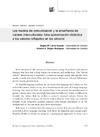Identificador persistente para citar o vincular este elemento:
https://accedacris.ulpgc.es/jspui/handle/10553/11203
| Campo DC | Valor | idioma |
|---|---|---|
| dc.contributor.author | Larrea Espinar, Ángela Mª | en_US |
| dc.contributor.author | Raigón Rodríguez, Antonio | en_US |
| dc.date.accessioned | 2014-01-14T03:30:20Z | - |
| dc.date.accessioned | 2018-03-15T14:26:27Z | - |
| dc.date.available | 2014-01-14T03:30:20Z | - |
| dc.date.available | 2018-03-15T14:26:27Z | - |
| dc.date.issued | 2012 | en_US |
| dc.identifier.issn | 1133-1127 | en_US |
| dc.identifier.uri | https://accedacris.ulpgc.es/handle/10553/11203 | - |
| dc.description.abstract | With the turn of the century we have seen a string of political and cultural changes that have had a deep impact on economy and technology. The “global culture” phenomenon is nowadays a common concept spread through the mass media, namely television, films and the internet. However, cultural differences persist despite globalization. As English language teachers, we are aware that language and culture are two indivisible entities, that is to say, the cultural aspects are part of foreign language learning. The main problem the learner faces is the present day development of global culture, since this seemingly international behavior makes it difficult to identify the values that lay within a society’s internal culture. Given the complexity of this concept, we firmly believe that we must help our students identify more subjective cultural nuances that remain unnoticed or in the background, so we can break away from stereotypes. Television is a window into the values of a society. It is also an effective and powerful tool for language learning, both from the linguistic and cultural angle. Bearing all this in mind, we propose a pedagogical approach to carry out a cultural awareness exercise that enable the students understand the values of the American society as portrayed in the situation comedy Friends | en_US |
| dc.format | application/pdf | es |
| dc.language | spa | en_US |
| dc.relation.ispartof | LFE. Revista de Lenguas para Fines Específicos | en_US |
| dc.source | LFE. Revista de lenguas para fines específicos. Las Palmas de Gran Canaria: Universidad de Las Palmas de Gran Canaria, 1993-.-- ISSN 1133-1127.-- n. 18, 2012, p. 135 | en_US |
| dc.subject | 570107 Lengua y literatura | en_US |
| dc.subject | 550510 Filología | en_US |
| dc.subject.other | Culture | en_US |
| dc.subject.other | Television | en_US |
| dc.subject.other | Cultural studies | en_US |
| dc.subject.other | Language learning | en_US |
| dc.subject.other | Globalization | en_US |
| dc.title | Los medios de comunicación y la enseñanza de valores interculturales: una aproximación didáctica a los valores reflejados en los sitcoms | en_US |
| dc.type | info:eu-repo/semantics/article | en_US |
| dc.type | Article | en_US |
| dc.compliance.driver | 1 | es |
| dc.identifier.absysnet | 233536 | - |
| dc.investigacion | Artes y Humanidades | en_US |
| dc.rights.accessrights | info:eu-repo/semantics/openAccess | es |
| dc.type2 | Artículo | en_US |
| dc.identifier.ulpgc | Sí | es |
| dc.description.esci | ESCI | |
| dc.description.erihplus | ERIH PLUS | |
| item.fulltext | Con texto completo | - |
| item.grantfulltext | open | - |
| Colección: | LFE, Rev. leng. fines específ. n.18, 2012 Artículos | |
Visitas
133
actualizado el 17-ago-2024
Descargas
93
actualizado el 17-ago-2024
Google ScholarTM
Verifica
Comparte
Exporta metadatos
Los elementos en ULPGC accedaCRIS están protegidos por derechos de autor con todos los derechos reservados, a menos que se indique lo contrario.
